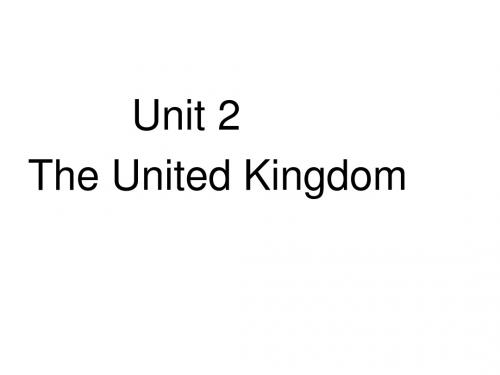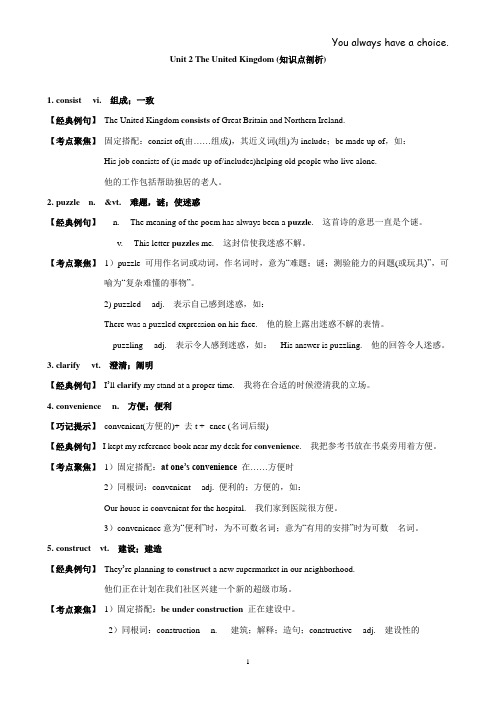高中英语必修五Unit 2 The United Kingdom ---语言学案
- 格式:doc
- 大小:62.00 KB
- 文档页数:4



人教版高中英语必修五Unit2TheUnitedKingdom高中英语学习材料madeofjingetiejiUnit 2The United Kingdom考点摘要单词Rule, name, divide, debate, clarify, link, united, however, relation, legal, convenience, settle, attraction, treasure, collection, construct, influence, evidence, worthwhile, project, headquarters, arise, arrange, wedding, fold, uniform, puzzle, error, suggestion, statue, communism, thrill, unfair, available, smart, relation, sightseeing, delight.短语consist of, refer to, as well as, to one’s surprise, instead of, break away, leave…, out, pick up, break down, divide…into, take the place of,句式1.It takes sb…2.There’s no need to do3.The three countries found themselves united…4.However, just as they were going to get Ireland connected…5.You must keep your eyes open…if you are going to make your tripto the United kingdom worthwhile.6.What did you mean by doing…?7.I beg your pardon?语法过去分词作宾语补足语…the three countries found themselves united peacefully… he had them killed while they were asleep.第二单元能力过关题一.单词拼写。

Unit 2 The United Kingdom (知识点剖析)1.consist vi. 组成;一致【经典例句】The United Kingdom consists of Great Britain and Northern Ireland.【考点聚焦】固定搭配:consist of(由……组成),其近义词(组)为include;be made up of,如: His job consists of (is made up of/includes)helping old people who live alone.他的工作包括帮助独居的老人。
2. puzzle n.&vt. 难题,谜;使迷惑【经典例句】 n. The meaning of the poem has always been a puzzle. 这首诗的意思一直是个谜。
v. This letter puzzles me. 这封信使我迷惑不解。
【考点聚焦】1)puzzle可用作名词或动词,作名词时,意为“难题;谜;测验能力的问题(或玩具)”,可喻为“复杂难懂的事物”。
2) puzzled adj. 表示自己感到迷惑,如:There was a puzzled expression on his face. 他的脸上露出迷惑不解的表情。
puzzling adj. 表示令人感到迷惑,如: His answer is puzzling. 他的回答令人迷惑。
3. clarify vt. 澄清;阐明【经典例句】I’ll clarify my stand at a proper time. 我将在合适的时候澄清我的立场。
4. convenience n. 方便;便利【巧记提示】convenient(方便的)+ 去t + -ence (名词后缀)【经典例句】I kept my reference book near my desk for convenience. 我把参考书放在书桌旁用着方便。


高中英语必修五课文及翻译集团档案编码:[YTTR-YTPT28-YTNTL98-UYTYNN08]-必修 5Unit 2 The United KingdomReadingPUZZLES IN GEOGRAPHYPeople may wonder why different words are used to describe these four countries: England, Wales, Scotland and Northern Ireland. You can clarify this question if you study British history.First there was England. Wales was linked to it in the thirteenth century. Now when people refer to England you find Wales included as well. Next England and Wales were joined to Scotland in the seventeenth century and the name was changed to "Great Britain". Happily this was accomplished without conflict when King James of Scotland became King of England and Wales as well. Finally the English government tried in the early twentieth century to form the United Kingdom by getting Ireland connected in the same peaceful way. However, the southern part of Ireland was unwilling and broke away to form its own government. So only Northern Ireland joined with England, Wales and Scotland to become the United Kingdom and this was shown to the world in a new flag called the Union Jack.To their credit the four countries do work together in some areas (eg, the currency and international relations), but they still have very different institutions. For example, Northern Ireland, England and Scotland have different educational and legal systems as well as different football teams for competitions like the World Cup!England is the largest of the four countries, and for convenience it isdivided roughly into three zones. The zone nearest France is called the South of England, the middle zone is called the Midlands and the one nearest to Scotlandis known as the North. You find most of the population settled in the south, but most of the industrial cities in the Midlands and the North of England. Although, nationwide, these cities are not as large as those in China, they have world-famous football teams and some of them even have two! It is a pity that the industrial cities built in the nineteenth century do not attract visitors. For historical architecture you have to go to older but smaller towns built by the Romans. There you will find out more about British history and culture.The greatest historical treasure of all is London with its museums, art collections, theatres, parks and buildings. It is the centre of nationalgovernment and its administration. It has the oldest port built by the Romans in the first century AD, the oldest building begun by the Anglo-Saxons in the 1060s and the oldest castle constructed by later Norman rulers in 1066. There has been four sets of invaders of England. The first invaders, the Romans, left their towns and roads. The second, the Anglo-Saxons, left their language and their government. The third, the Vikings, influenced the vocabulary and place-names of the North of England, and the fourth, the Normans, left castles and introduced new words for food.If you look around the British countryside you will find evidence of all these invaders. You must keep your eyes open if you are going to make your trip to the United Kingdom enjoyable and worthwhile.人们可能会奇怪为什么用不同的词语来描述英格兰、威尔士、苏格兰和北爱尔兰这四个国家。
高中英语学习材料***鼎尚图文理制作***过去分词作宾语补足语编稿:牛新阁审稿:王春霞概念引入上个单元我们学习了过去分词作表语和定语的用法。
现在我们继续学习过去分词作宾语补足语。
看这些句子:1. Now when people refer to England you find Wales included as well.2. Finally the English government tried in the early twentieth century to form the UnitedKingdom by getting Ireland connected in the same peaceful government.3. You find most of the population settled in the south.4. They found the window broken.5. ..., so Pingyu had a photo taken standing on either side of the line.这些句子中的黑体部分都是过去分词作宾语补足语。
用法讲解宾语补足语是同学们学习英语的一个小难点,许多同学都弄不清到底什么是宾语补足语,它的作用是什么,所以我们今天就从宾语补足语讲起,重点讲解过去分词作宾语补足语的内容。
什么是宾语补足语英语中一些动词除需要一个宾语外,还需有宾语补足语句子意义才完整,这样就构成了英语的六种基本句型(见【补充】)中的“主语+谓语+宾语+宾语补足语”句型。
宾语与宾语补足语之间在逻辑上是主谓关系。
可作补足语的结构有名词、形容词、副词、介词短语、动词-ing形式、过去分词、不定式等。
宾语和其宾语补足语也被称为复合结构。
1. 作补足语的词语:1)We consider him (to be) a good teacher. 我们认为他是一个好老师。
高中英语学习资料madeofjingetiejiUnit 2 The United Kingdom编稿:牛新阁审稿:王春霞目标认知重点词汇divide, clarify, accomplish, conflict, convenience, attract, influence, arrange, delight,小词简析重点短语consist of, refer to , credit/ to one ’ s credit,break away (from), leave out, take the place of, break down重点句型find + n./ pro. + 宾语补足语知识解说重点词汇divide【原句回放】England can be divided into three main areas.英国被分为三个主要地区。
【点拨】 divide 分开,分配常用搭配: divide ... into...把......分成......A line of trees divides the garden in half.一行树把花园分开成两半。
Divide this line into 20 equal parts. 把这条线分成20 个相等的部分。
Let’s divide ourselves into several groups.我们分成几个小组吧。
【拓展】 divide 与 separate1)divide 指把一个整体分成几部分,平时按比率划分。
2) separate 指把原来结合在一起或混杂的东西分开,东西原来没有一致性,有时含有“强行分开”之意。
Divide the money among the six of you.这笔钱你们六个人分。
We’d better separate the good ones from the bad ones. 我们最好把好的和坏的分开。
Unit2 The United Kingdom-词汇篇__________________________________________________________________________________ __________________________________________________________________________________1.掌握重点词汇的搭配及用法,能够正确完成基础类型题。
2.掌握重点句型的用法,会模仿句型进行写作和翻译。
◆重点词组:1. keep your eyes open 睁大你的眼睛2. consist of由…组成3. leave out省去不考虑遗漏4. divide into 分成5. prepare to 准备6. compare A with B 与…比7. compare A to B 把A比作B8. asked the boss on the phone 通过电话9. work out 做出;解决;设计出;计算出;锻炼;发展,进行;work on对..起作用;企图影响或说服,忙于work in 在…工作work off 渐渐消除处理排除卖掉发泄10. a furnished house with all modern conveniences 一个带家具的房子有所有的现代方便的设施11. familiar with熟悉12. worried about the time available担心时间不够13. make a list of 列出关于…的清单14. on special occasions 在特殊的场合15. the four-hundred-year-old uniform 有四百年历史的制服16. set the world time设置世界时间17. on either side of the line 在线的两端18. fall asleep入睡19. with delight 十分喜悦的◆词句精讲1. consist vi.由...组成, 在于, 一致★ consist of=be made up of 由…组成;由…构成[典例] 1) Substances consist of small particles called molecules. 物质是由叫做分子的微粒组成的。
Unit 2 The United Kingdom 本学案的目的:旨在让同学整体了解本单元要点
旨在提供综合运用所需材料
一、语言要点
IV 重点词汇(旨在提供综合运用所需材料)
1.consist vi.由...组成, 在于, 一致
consist of=be made up of 由…组成;由…构成
[典例]
1)Substances consist of small particles called molecules. 物质是由叫做分子的
微粒组成的。
2)True charity doesn't consist in almsgiving. 真正的慈善不在于施舍。
[练习]翻译:
1) 这支球队由12人组成。
___________________________________________________________________ _________
Keys: 1) the team consists of 12 players.
2.convenience n.便利, 方便, 有益, 有用的, 方便的用具
[典例]
1) We bought this house for its convenience.我们买下这所房子是为了方便。
2) Please come at your convenience.请在你方便的时候来。
3) Gas is one of the modern conveniences the newly-built apartment building provides.
这幢新造的公寓大楼装有煤气等现代化设备。
[重点用法]
inconvenience n.不方便
convenient adj.便利的,适宜的
at one's convenience在某人方便的时候
for one's convenience(of)为了某人的方便
for convenience's sake为了方便起见
make a convenience of …利用
[练习]翻译句子
1) 如果方便就来看看我。
___________________________________________________________________ _________
2) 你方便明天开始工作吗?
___________________________________________________________________ _________
Keys: 1)Come and see me if it is convenient to you.2) Will it be convenient for you to start work tomorrow?
3.available adj.可用到的, 可利用的,有空的, [典例]
1) Attention,please.These tickets are available on the day of issue only.
请注意,这种车票仅在发售当天有效
2) Dresses are not available in your size, I’m afraid.
这些衣服恐怕没有你的尺寸。
[重点用法] 反义词:unavailable
[考例]单项填空
We regret to inform you that there are no tickets ______ for Friday’s performance. A. available B. spare C. convenient D. affordable
【解析】根据句意“我们很遗憾地通知你星期五的演出票没有了”。
可知available “可提供的,可得到的”,常作后置定语。
答案:A。
[练习]翻译句子
1) 这里没有这本书。
___________________________________________________________________ _________
2)在拥挤的地方,没有车位可用。
___________________________________________________________________ _________
Keys: 1) This book is not available here. 2) In the busy place, no car parking is available for use.
V 重点词组(旨在提供综合运用所需材料)
1.take the place of代替,取代
[典例]
1) In the future, natural gas will take the place of petrol as the major fuel.将来天然气会代替汽油成为主要的能源。
2) I’ll take the place of Mr.Lin next week.=I’ll take Mr.Lin's place next week.下周我将代替林老师。
[重点用法]
take place发生;举行
take one's place就位;代替某人
in place of (= instead of)代替
in place在适当的位置
out of place不得其所,不适当地
in the first place首先
from place to place到处;各处
[练习] 选择以上短语填空
1) A sudden accident _______ in the street last evening.
2)She likes everything _______ before she starts to work.She hates a mess.Keys: 1)took place 2)in place
2. break down损坏,跨,压倒,分解
[经典例句]
1) The bridge broke down.桥塌了。
2) The engine broke down.发动机坏了。
3) He has broken down from overwork.他因工作过度而累垮了。
4) Water can be broken down into hydrogen and oxygen.水可以分解为氢和氧。
5) The plan to build another chemical work has broken down because it will cause serious pollution.再建一个化工厂的计划失败了,因为这将引起严重的污染。
[词汇激活]
break away from摆脱,脱离
break in闯入;插话
break into闯入;破门而人;打断(谈话)
break off中止;折断;打折
break out爆发;突然发生
break through突破;冲垮
break up分解;(使)结束;分开,分离
[练习]请填人适当的介词或副词:
1)To understand the grammar of the sentence, you must break it ___________ into pieces.
2) The elevator broke _______.
3) Fighting broke_______ in the prison cells.
4)Fire broke _______during the night.
5) On the way to the prison house, the prisoners suddenly broke _______ from the policeman.
Keys: 1) down 2) down 3) out 4) out 5) away
3. leave out省去,遗漏
[典例]
1) You have left out the most important word in this sentence.
你在这一句中遗漏了最重要的一个单词。
2) Don't leave me out when you invite people to your party.
当你邀请人们去参加晚会时,别把我漏掉了。
[重点用法]
leave for 动身到(某处)
leave alone不管;撇下…一个人
leave aside搁置
leave behind遗忘;遗留
[练习]请填人适当的介词或副词:
1) They were left ______ in the wilderness.
2) He was asked to make up the information left ______ by the leader.
Keys: 1) alone 2) out。